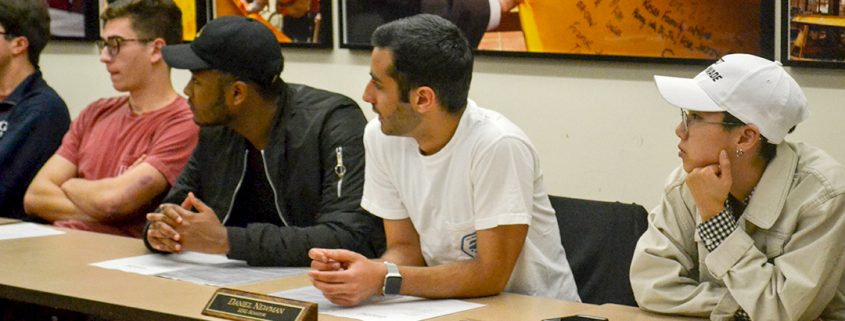USG passes resolution clarifying pass-fail courses
Senators passed a resolution to allow easier access to information about their pass-fail courses at an Undergraduate Student Government meeting Tuesday evening. The resolution, authored by Sen. Tyler Matheson and first presented on Jan. 10, calls for a change in the email interface sent to students to more clearly communicate which courses they are taking for grades and which courses they are taking pass-fail.
Matheson emphasized the importance of the resolution’s focus on the way pass-fail courses were previously presented to students. He said that many students had difficulty finding out how many pass-fail courses they were registered for, and the resolution aimed to streamline this information into a succinct email.
“The goal of this resolution is to give the students more information about their pass-fail classes,” Matheson said. “It should be easier for students to see whether or not they are signed up for any pass-fail classes, and if so, how many they are signed up for.”
Some of the concerns fellow senators proposed regarded the usefulness of Matheson’s resolution. Sen. Tiffany Lian posed questions about the details and the nature of the resolution.
“Would the resolution cover changes in email and in the myUSC calendar, or would it only result in a change in the email?” Lian asked.
Lian said that it would be more effective to add a different color code for pass-fail classes on students’ myUSC calendars as an addition to the improved e-mail interface.
According to Matheson, however, adding a color code to students’ myUSC calendars would require an additional communication initiative with the registrar, and would make the process more tedious. As of now, Matheson said, the most effective method would be to improve the pass-fail course email design.
Sen. Paul Samaha asked why Matheson’s initiative was in the form of a resolution as opposed to a proposal. Samaha said that resolutions tend to hold more weight in terms of urgency, which Matheson’s resolution did not seem to have.
“I believe that holding back resolutions encourages non-action in the Senate and in the administration,” Matheson said in response. “So making this plan a resolution instead of a proposal allows it to sit on the administration’s desk with more weight, which I think it deserves given that it is an important issue.”
Matheson’s resolution passed with nine for and three against.
After passing the resolution, Senators proposed ideas to decrease bike-related accidents while allowing commuters to travel from their residences to school efficiently. USG Vice President Austin Dunn proposed making Trousdale Parkway a bike-free zone and redirecting passing bikes to follow a path around the perimeter of campus.
When the meeting adjourned, the bike discussion was still in an initial phase, but Dunn said that the University administration would continue to coordinate with the USC Bicycle Coalition to develop an effective and feasible plan to decrease bike-related accidents while allowing students to commute.
“What we know for sure is that we won’t be completely banning bikes on campus,” Dunn said. “But there definitely will be a drastic decrease in bike traffic, which will improve student safety and wellbeing.”

